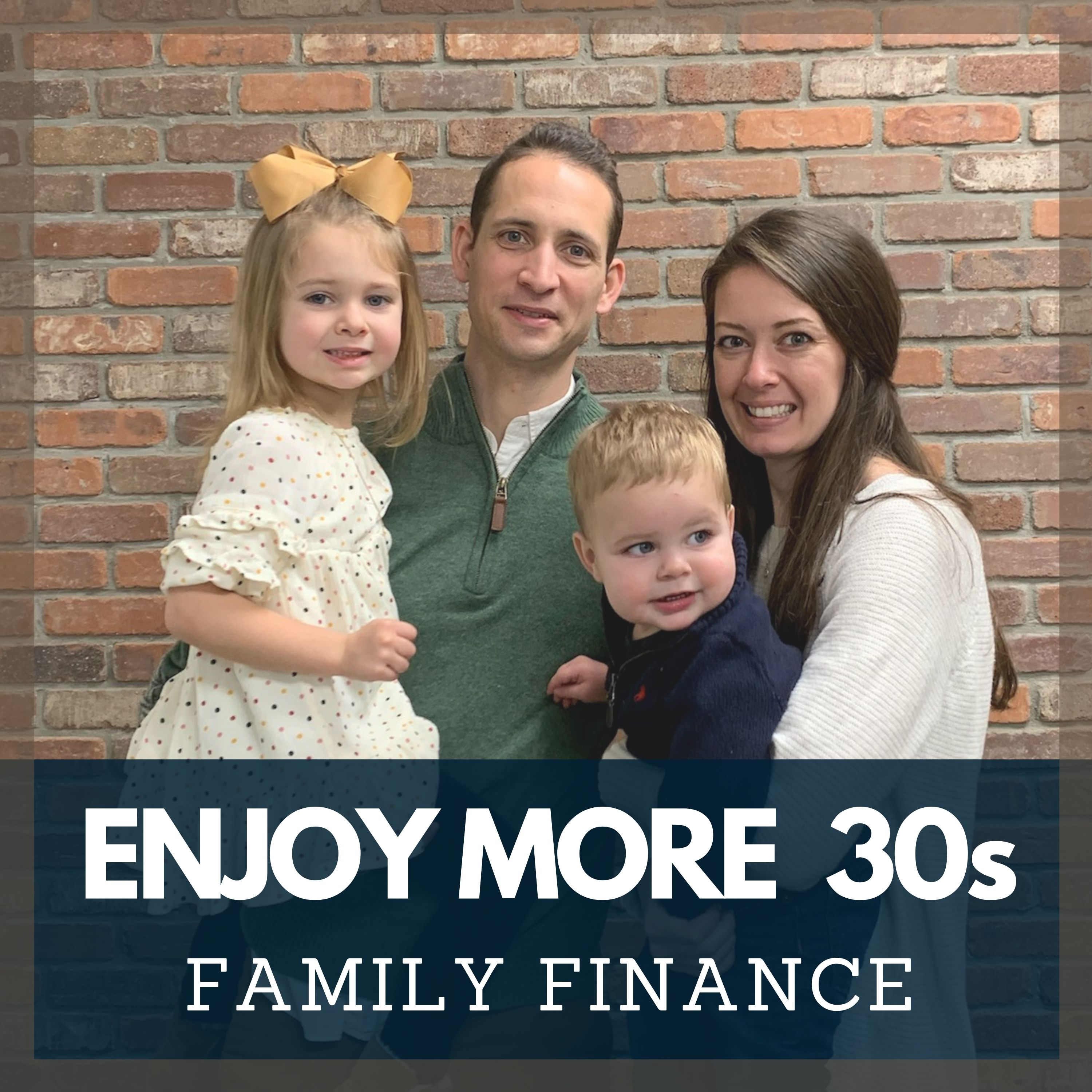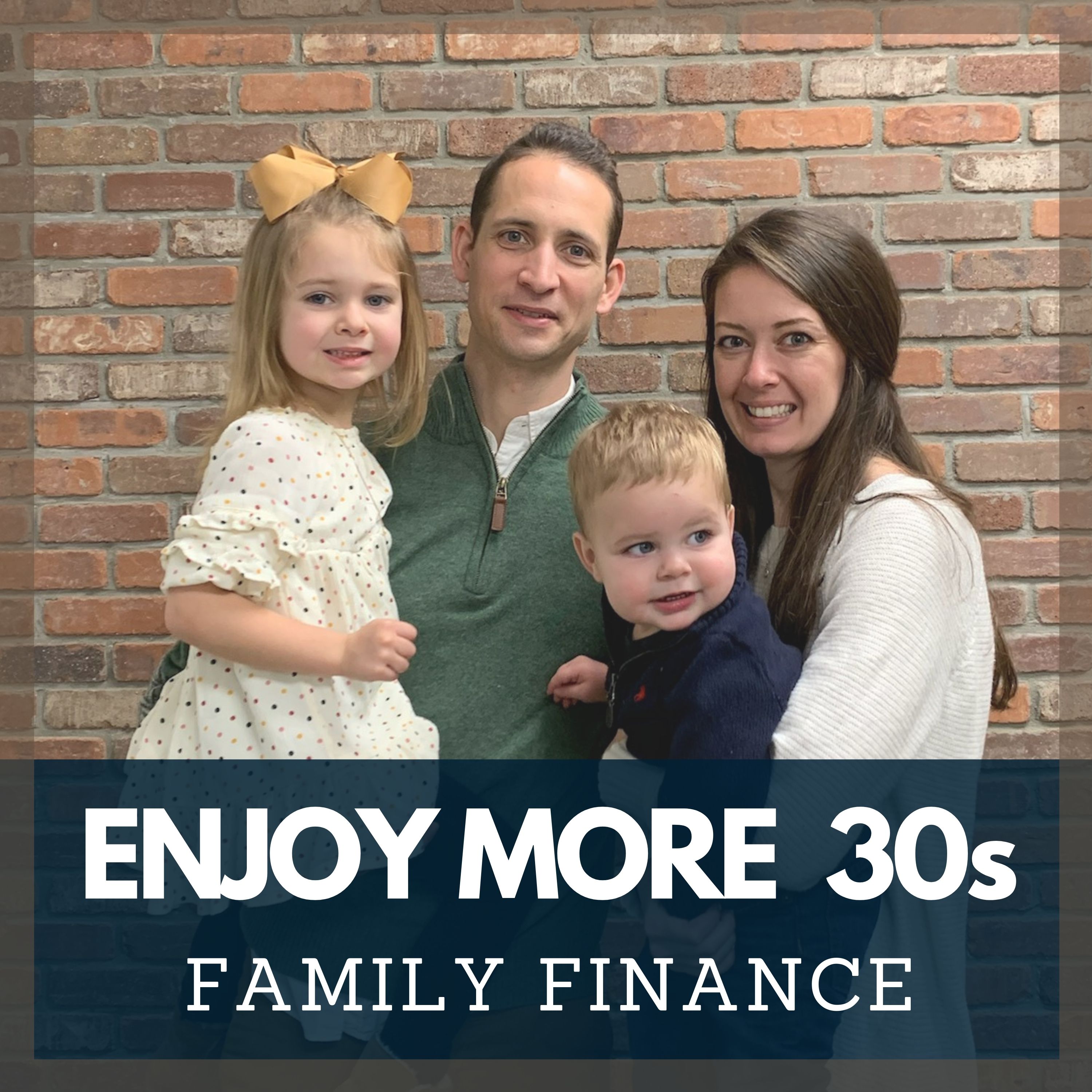Episode 7
Don't Worry, We Are All Emotional Investors | Series 4.7
Investing & emotions can go hand in hand - learn how to overcome this all too common problem.
Securities offered through TFS Securities, Inc., and Advisory Services through TFS Advisory Services, an SEC Registered Investment Advisor Member FINRA / SIPC. TFS Securities, Inc. is located at 437 Newman Springs Road, Lincroft, NJ 07738 (732) 758-9300.
Transcript
Welcome to the EnjoyMore30s Family Finance
Voiceover Audio:podcast. The only podcast dedicated to making life more
Voiceover Audio:enjoyable for young families by hitting on the financial topics
Voiceover Audio:that tend to weigh on us, stress us out, and distract our focus
Voiceover Audio:from simply enjoying life.
Joseph Okaly:Hello, and welcome to the seventh episode of the
Joseph Okaly:Your Major Money Misnomers series. As always, if you like
Joseph Okaly:what you're hearing, please make sure to subscribe or follow us
Joseph Okaly:on Apple podcasts or wherever you listen. Clicking that star,
Joseph Okaly:leaving a review, it really really does help other young
Joseph Okaly:families out there find us.
Joseph Okaly:So last week, we discussed Long Term Disability...MORE Likely to
Joseph Okaly:Happen? that covered what i actually worse than deat
Joseph Okaly:financially and that is lon term disability as well as what
Joseph Okaly:you needed to know about protecting yourself against it.
Joseph Okaly:So really make sure to check that out if you have not
Joseph Okaly:already. Today our title is Don't Worry, We Are All
Joseph Okaly:Emotional Investors, where we are going to discuss why
Joseph Okaly:emotions tend to play such a big unwelcomed part in investing and
Joseph Okaly:what you can do to try and not have it really work to your det
Joseph Okaly:iment. So as I got older, I wou d up turning into a person who
Joseph Okaly:doesn't have much of a sweet too h. Some of that was just mor
Joseph Okaly:of a healthy eating kind of a f cus but things like ya know cake
Joseph Okaly:cupcakes, icing, I actually nev r enjoyed them really at any poi
Joseph Okaly:t in my life. And that, you kno , makes me a big weirdo. Right?
Joseph Okaly:o if it's something that sal y though, I'll gladly partake
Joseph Okaly:o complete excess. So that brin s me at least a little bit ba
Joseph Okaly:k towards normal. Anyway, despi e that, there are some notab
Joseph Okaly:e exceptions when it comes o sweets for me that still exist
to this day:Ice cream from m hometown, Denville Dairy an
to this day:frozen key lime pie. Now whil I'll go to my grave with th
to this day:strong and correct, I might ad , assertion that Denville D
to this day:iry makes the best ice cream ou of anywhere on the planet, whic
to this day:is a bold statement, it is just ice cream. The frozen key lime
to this day:pie may also sound a bit kin of specific. And the reasons
to this day:for both continuing past my s eet tooth phase, let's say is
to this day:the emotional attachment that I ave for each of them. Denville D
to this day:iry was the place we always ent growing up. So when good th
to this day:ngs happened, we went to Den ille Dairy. We had ice cream
to this day:akes there for our birthday , a lot of birthdays, I still d
to this day:drive out and get another one. nd I fully realized that a la
to this day:ge part of that nostalgi emotional connection I have is
to this day:hat drives that. And the same thing goes for the frozen ke
to this day:lime pie, except instead of childhood connection, it's the
to this day:treat that Lauren and I ate on our anniversary trip
to this day:own in the Florida Keys when we found out she was pregnant with
to this day:our first child Avery. So remember exactly where I was,
to this day:remember going out and celebr ting like that. I know that
to this day:I'm being influenced by my emo ions but in this case, it's
to this day:okay. It feels you know, feels g od. What you need to know thoug
to this day:when it comes to investing is t at we're also extremely emotiona
to this day:. But it often doesn't really re ult in a good feeling. Making
to this day:r losing money makes us emoti nal and when we get emotional,
to this day:we tend not to take the best app oaches. As we discussed in t
to this day:e first series 1.6 Investments hould Be Boring, we recommend
to this day:preading out your money in ifferent areas all the time
to this day:because while every market a ea will generally go up over
to this day:ime, in the short term, no one i really sure what area is goi
to this day:g to do the best. So essential y, what does the best this
to this day:ear may likely not do the b st next year. And that make
to this day:sense, right? However, when you look at your account, and fund A
to this day:went up 20% last year and fun B went down 5%, I'm guessing y
to this day:ur first reaction won't be to ay, 'hey, let me take money o
to this day:t of that fund A which was so great and put into fun B th
to this day:t kind of stunk?' No, of course ot, you're much more likely t
to this day:say 'well, you know, forget und B, let's put it all into fun
to this day:A! Let's go!', right? So you can see there's easily a discon
to this day:ect between the logical "every year a different area tends
to this day:to lead" with the practical "ta e money out of the ones that d
to this day:d the best and put into the ones that did the worst" action off o
to this day:that, because your emotions ca quickly get in the way. And you
to this day:may be surprised to hear ther 's actually a whole invest
to this day:ng approach that's called he odd lot theory that's base
to this day:on doing exactly the opposite f what individual or wha
to this day:they call retail investors do, s opposed to what institutional
to this day:ype investors are doing. So when normal people buy stock, they do
to this day:'t buy in a flat, even kind o a quantity. They might b
to this day:y 17 shares or 31 shares, what ver they can kind of afford is
to this day:hat they buy. And it comes out t this random kind of odd num
to this day:er. Institutional Investors n the other hand, they buy
to this day:n what are called round lots. o say 1000 shares 2000 sh
to this day:res. So with this approach essen ially looks at is what are all t
to this day:e 17 and 31 share type transac ions or odd lots. What are the
to this day:doing? And let's simply do the opposite. Because we're goi
to this day:g to go ahead and assume that normal individual investors are
to this day:robably doing the wrong th ng. So, where the emotions t
to this day:nd to be the most debilitati g though, is when there are
to this day:arge drops in the market. You he r about it on TV, the radio, the
to this day:bring in experts about how fas the sky is going to fall. My fa
to this day:orite though, is the pict re of the disheveled stockbroke
to this day:on the floor of the exchange you know, you could picture h
to this day:m kind of pulling on his face wi h just papers flying everywhe
to this day:e behind them, they, they see to always have that
to this day:ne ready to go. This environment though, where things are
to this day:ropping, it makes it exceedingly difficult to not act emotiona
to this day:ly. What makes it so bad here, t ough, is that if you say sell af
to this day:er everything drops, because y u're afraid, so fear and emoti
to this day:n, and you're afraid that it' going to drop more, you h
to this day:ve put yourself in a position th t you can't recover now. You c
to this day:n't regain what you lost if ou aren't invested. What you ca
to this day:do, though, to try and counte act this is to plan emotionally
to this day:ahead of time, both for the da to day and the big drops. It's
to this day:almost assured that there will be another and more likely man
to this day:of these events in your li etime. Historically speaking, t
to this day:ey happen every six years or s on average. So the 12 years be
to this day:ween 2008 financial crisis and 2020's COVID was actually
to this day:uite a large spread. So the q estion you should be asking you
to this day:self is really more, 'wh t are you going to do emotional
to this day:y to prepare yourself for whe , not if, the next one comes?'
to this day:he first thing to know, you will most likely be emo
to this day:ional. Just like I know emotio s are influencing me to drive
to this day:out and buy that Denville Dai y birthday cake still. So don'
to this day:tell yourself, you'll be les emotional next time, you a
to this day:most certainly will. It's going o be a new situation with new
to this day:causes. Same drop, maybe. But it s very, very difficult to no
to this day:act emotionally. So just expect ng yourself to not be the same
to this day:xact way in this upcoming scenario, whatever it may happen
to this day:is probably not a likely way hat it's going to unfold. Second
to this day:is you shouldn't have any money nvested that you're going to nee
to this day:in this next, say one to two ears anyway. So remember, you ha
to this day:e years of time for these i vestments to come back up again
to this day:when you're going to need them. ny short term money again s
to this day:ould never be put into an investment. Next, whether thr
to this day:ugh an advisor or on your own hrough an allocation type
to this day:of a fund, having someone outsid of yourself managing the fund
to this day:on a mathematical basis making those rebalancing decisi
to this day:ns so selling areas that have one well and reinvesting into a
to this day:eas that haven't done as well lately removes your emoti
to this day:ns as having an input in thos day to day. Lastly, for thos
to this day:particularly big drops, remem er what makes the market go up
to this day:and down. In series 2, 2.5 to be specific, we talked about S
to this day:ocks Lead, Don't Follow and h w the stock market is a leading
to this day:ndicator. Investors are acting on what they think will happen a
to this day:d if they have no idea what wil happen, so if there'
to this day:a very high degree of uncertain y, things tend to drop very
to this day:apidly. So think COVID before we knew what it was or had
to this day:much of a plan, or the financi l crisis back in 2008,
to this day:before we knew how the governmen was going to respond. Once inv
to this day:stors believed they had some i ea of where things were going a
to this day:ain, you started to
to this day:So as a recap for today, realize that you're not at all alone,
to this day:when it comes to mixing emotions with investing. Everyone out
to this day:there does that to some degree. Those who manage it, though more
to this day:successfully are the ones who set up a proper system and
to this day:mindset,. They acknowledge it will almost certainly happen
to this day:again, multiple times over, they only invest funds they are not
to this day:going to need for the next few years. And they use an outside
to this day:resource whether through an allocation fund or a diversified
to this day:program through an advisor. So they're not in direct control
to this day:for emotional decision making. Finally, they realize that
to this day:uncertainty tends to be the biggest market driver and as
to this day:that changes, so things become less uncertain, the direction of
to this day:the market will likely change as well.
to this day:So as always, thank you very much for tuning in today. If you
to this day:are able to implement what we're talking about in this episode,
to this day:or any episode that's just fantastic. You have less to
to this day:worry about than before. You can just focus on what we're all
to this day:wanting to do, which is enjoying life. If you are wanting help
to this day:with these things though, or you have questions you need help in
to this day:clarifying, check out the Ask Joe section on the show's
to this day:website www.EnjoyMore30s.com. That's EnjoyMore30s.com and if
to this day:you did enjoy today's episode specifically, make sure to again
to this day:jump on, review, follow, subscribe on Apple podcasts,
to this day:wherever it might be. There are literally millions of young
to this day:families out there I'm trying to reach and help just like you.
to this day:We've now come to the final episode already of this series
to this day:and it's called Advisors Aren't Hershey Bars where we're going
to this day:to discuss what you need to know about the many different types
to this day:of advisors out there. You might be surprised about how many
to this day:differences there can be and what you can do to make sure you
to this day:find one that's a good fit for you if you are wanting one.
to this day:Until next week thanks for joining me today as always, and
to this day:I look forward to connecting with you again soon.
Voiceover Audio:The conversations on this show are
Voiceover Audio:Joe's opinions and provided for general information purposes
Voiceover Audio:only. They do not constitute accounting, legal, tax or other
Voiceover Audio:professional advice for your specific situation. You should
Voiceover Audio:always seek appropriate advice from a financial advisor,
Voiceover Audio:accountant, lawyer or other professional before acting upon
Voiceover Audio:any content or information found here first. Joe is affiliated
Voiceover Audio:with New Horizons Wealth Management LLC, a branch office
Voiceover Audio:of TFS Securities, Inc., and TFS Advisory Services an SEC
Voiceover Audio:Registered Investment Advisor member FINRA/SIPC.


